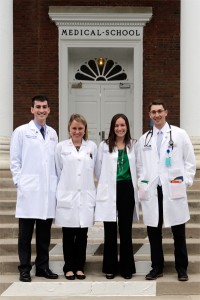Education Highlight | The Evolution of Medical Education at UVA: 3+1 Resident Scheduling
EDUCATION HIGHLIGHT:
The Evolution of Medical Education at UVA
Implementation of 3+1 Resident Scheduling System
The Internal Medicine residency training program continued its reorganization in FY 2015 with the transition to a 3+1 scheduling model (three blocks of inpatient rotations alternating with a dedicated block in the outpatient setting). The change is intended to enhance the quality of patient care and the overall educational experience for residents.

2014-15 Internal Medicine Chief Residents (l-r) Michael Devitt, MD; Trish Gordon, MD; Elizabeth McKinney, MD; and Bradley Weinbaum, MD. They were instrumental in planning the new 3+1 resident scheduling system.
The 3+1 scheduling plan was mapped out by a team that included the four chief residents for the Internal Medicine Residency program, Vice Chair for Education Gerald Donowitz, MD, key clinical faculty, and education program administrators; it became operational on July 1, 2014. One important goal of the transition was to maintain the values and characteristics that distinguish UVA’s program: resident-designed training, a 1:1 resident-intern inpatient team, a curriculum customized to the needs of each resident, and maintenance of a healthy work/life balance.
The four chief residents — Michael Devitt, MD; Trish Gordon, MD; Elizabeth McKinney, MD; and Bradley Weinbaum, MD, gave a joint Medical Grand Rounds presentation on May 20, 2015, entitled “Evolution of Medical Education at UVA: It’s Darwinian.” Their presentation:
- Provided an overview of current trends in graduate medical education.
- Reviewed pertinent literature about the effects of increased supervision on resident education.
- Reviewed the advantages and disadvantages of the 3+1 system.
- Discussed future directions for graduate medical education at UVA, including changing the structure of educational conferences and the implications of geographic units.
The department thanks the departing chiefs for their hard work in preparing for and implementing this significant change in the residency program.
